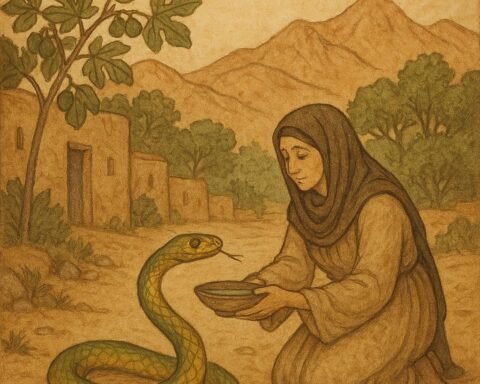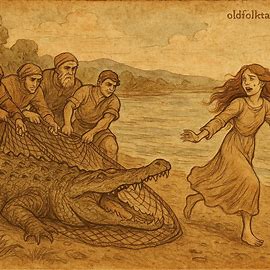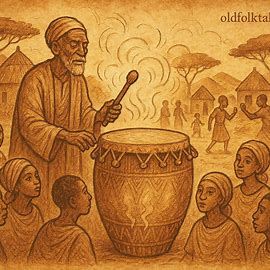A family of rhinoceroses once sat together after a meal, speaking of life on earth and in heaven. Some praised heaven as a place of eternal joy, while others preferred the earth. Their talk eventually turned to the turtle.
“Poor creature!” said one, “It cannot even run fast when danger comes.”
“Yet it is a fine little being,” the mother remarked.
“Isn’t it easy to defeat such a slow one in a race?” the youngest rhinoceros asked, puffing with pride.
The father warned, “Perhaps, but never forget turtles can be clever.”
The youngest rhino scoffed. “How can that be? I am sure I can outrun him with ease.”
With this arrogant thought, he left his parents and went to a stream where turtles often gathered. Before long, he spotted one.
The rhino laughed. “Turtle, how small you are!”
“Yes, I am small,” replied the turtle calmly. “But I am not ashamed of it.”
“What? Not ashamed? If I were you, I would never speak so boldly.”
“That is your choice,” said the turtle. “But to me, being small is no shame. I am in my place, as you are in yours.”
The rhino sneered. “Foolish creature! You are nothing compared to me.”
The turtle remained steady. “Then cut the insults, friend. What are you truly here for?”
“I want to bring you down to your senses,” the rhino growled. “Perhaps then you will learn respect.”
“Then let us prove who has sense,” said the turtle.
“That is why I am here,” agreed the rhino.
They settled on a race to the south, crossing four streams. The rhino added proudly, “If I lose, I will give you my sister as your wife.”
The turtle accepted. “Meet me here at sunrise.”
READ: The Hare and the Two-Mouthed Python: A Bemba Folktale from Zambia
That night, the turtle summoned his relatives. One stationed himself at the first stream, another at the second, another at the third, and another at the fourth, so that at each point a turtle would already be waiting.
The next morning, the rhino arrived. “Are you ready? Let us settle this today.”
“With no delay,” replied the turtle. “Let the monkey in that tree give us the signal.”
At the word “Go!” the rhino dashed off, head low and legs pounding the earth. The turtle, however, did not move. He chuckled, knowing his family was already in place.
At the first stream, the rhino was startled to hear a turtle’s voice: “Young and insolent rhino! I have already beaten you here!”
The rhino shook his head and ran harder.
At the second stream, another turtle called out: “Your sister is mine, rhino! Remember your promise?”
Still the rhino pressed on.
At the third stream, the taunt was sharper: “Come overtake me if you can or surrender your sister. I am still ahead!”
The rhino, thinking the turtle was tiring, roared, “No compromise! I will win this yet!” and ran faster than ever.
But when he reached the fourth stream, another turtle was already waiting. “How can you hope to beat me, foolish rhino? I am already here!”
Shame burned the rhino’s heart. He stood frozen, defeated by a creature he had mocked as weak and worthless.
The turtle said calmly, “Your pride has brought you low. As for your sister, let her marry another rhino, one wiser than you, if such can be found.”
Since that day, turtles laugh among themselves about the rhino who had no brains, only legs. And whenever a rhinoceros comes to the water, they whisper and jeer, reminding him of the day strength was outwitted by wisdom.
Moral Lesson
This Bemba tale from Zambia teaches that arrogance leads to downfall. Strength alone is never enough; without wisdom, it becomes a burden. The rhinoceros believed speed and size made him superior, but the turtle’s clever planning overturned his pride.
The story reminds us that humility and intelligence carry greater power than boastful strength. True victory belongs to those who think carefully, not to those who merely rush ahead.
Knowledge Check
Q1: Who are the main characters in this Bemba folktale?
The rhinoceros (symbol of pride and strength) and the turtle (symbol of wisdom and patience).
Q2: What was the challenge between the rhino and the turtle?
They agreed to race south across four streams, with the rhino offering his sister’s hand in marriage if he lost.
Q3: How did the turtle manage to outwit the rhinoceros?
The turtle used his relatives, placing one at each stream so the rhino always found a turtle ahead of him.
Q4: What cultural value does this story highlight?
The Bemba emphasize humility, wisdom, and cooperation over pride and brute strength.
Q5: What lesson does the rhinoceros learn?
That arrogance without intelligence leads to shame and defeat.
Q6: What is the origin of this folktale?
It is a traditional tale of the Bemba people of Zambia.
Folktale Origin
Source: Bemba folktales, Folktales of Zambia by Chiman L. Vyas (1969), Zambia







